There isn’t a bodybuilder alive who doesn’t want bigger, more muscular arms. And anyone who tells you they think their arms are too big is probably lying! Whether you compete in bodybuilding or are just a recreational lifter, big arms are the badge of honor that every exerciser wants. Average Biceps Size: How Do You Measure Up?
To build impressive arms, you need to work on your biceps and triceps equally. This can come as a bit of a shock to novice lifters, who wrongly assume that their biceps are the most important muscle for arm size.
In fact, it’s the triceps that make up the larger proportion of your upper arm mass, so they need your attention too.
One of the best ways to make sure you train your biceps and triceps with the same volume is to do biceps/triceps supersets. As well as providing a balanced workout, supersets are also more time efficient and deliver a skin-splitting pump.
While you could write your own biceps and triceps superset workout, we’ve created one for you. Do this workout 1-2 times a week to turn your peashooter arms into cannons!
Arm Anatomy Basics
While you don’t need an in-depth knowledge of arm anatomy and physiology to build bigger biceps and triceps, it can help you make better decisions about which exercises to include in your workouts. Understanding how a muscle works means you will have a better understanding of the best way to train it.
So, feel free to skip this section if you just want a workout to follow. Otherwise, let’s go back to school and learn a little more about how the biceps and triceps function.
Biceps brachii
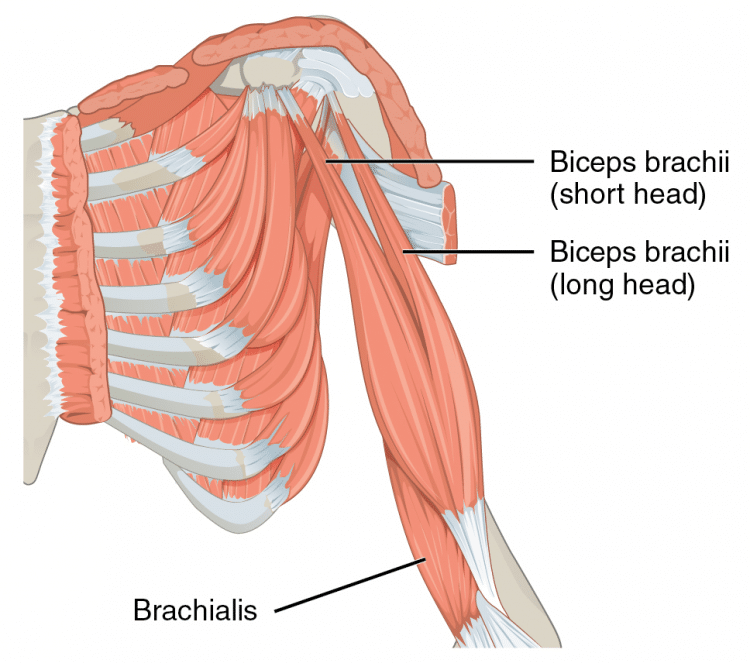
Biceps brachii means two-headed arm muscle. However, we usually shorten this to biceps for ease. The biceps are located on the front of your upper arm and crosses your elbow and shoulder joints. This means it’s a biarticular muscle and affects both of these joints.
The functions of your biceps are:
- Elbow flexion
- Forearm supination
- Shoulder flexion
The biceps have two origin points and one insertion point, which means it has two heads – the long head and the short head. The long head is attached to the back of the scapula, while the short head attaches more toward the front. The long head is responsible for your biceps peak, while the short head gives your biceps their width.
Both heads always work together, but it is possible to emphasize each one slightly by altering the position of your upper arm.
Brachialis
All biceps exercises also hit the brachialis, which is best thought of as another biceps muscle. Like the biceps, the brachialis is an elbow flexor but is not involved with shoulder flexion or forearm supination.
Located partially beneath the biceps brachii, the brachialis helps prop up your biceps to make them look even more impressive. It also contributes to upper forearm size.
Triceps brachii
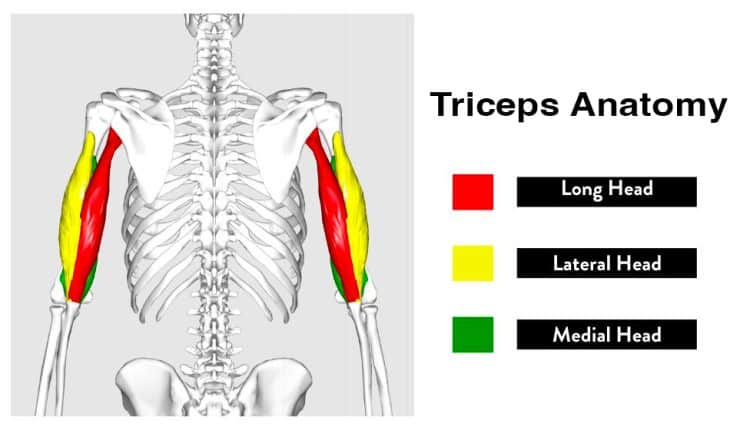
Located on the back of your arm, the triceps brachii, or triceps for short, is a three-headed muscle. Like the biceps, the triceps cross two joints – the elbow and the shoulder – making it a biarticular muscle.
The functions of the triceps are:
- Elbow extension
- Shoulder extension
The three triceps heads work together, but it’s possible to emphasize each one by altering the position of your arm. The long head is located on the inside of the upper arm, while the lateral head is found toward the outside. The medial head is between the long and medial heads.
An Introduction to Supersets
Before we reveal the nuts and bolts of this biceps and triceps workout, let’s take a moment to discuss supersets, explaining what they are and why they’re so beneficial and effective. That way, you’ll not only understand how to perform the workout, but you’ll understand why it works.
Firstly, supersets involve doing two exercises back-to-back. So, you do the first exercise and then, without resting, immediately do the second. On completion of exercise number two, you rest for the prescribed period and then repeat the pairing a couple more times.
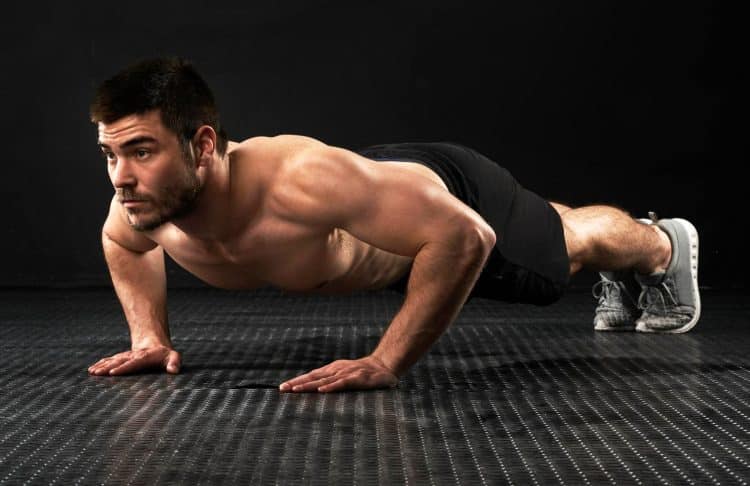
For example:
- Pull-ups x 8
- Push-ups x 15
- Rest 1-2 minutes and repeat
Types of Superset
There are several recognized types of superset, including:
- Agonist supersets – two exercises for the same muscle group, e.g., bench press and push-ups.
- Agonist/antagonist supersets – two exercises for opposing muscle groups, e.g., leg extensions and leg curls.
- Agonist/opposing synergist supersets – one exercise for a large muscle group and one for an opposing small muscle group, e.g., pull-ups and triceps pushdowns.
- Lower body/upper body supersets – one leg exercise followed by one torso or arm exercise, e.g., lunges and shoulder presses.
- Agonist/distant agonist supersets – two exercises for anatomically dissimilar muscle groups, e.g., biceps curls and calf raises.
- Pre-exhaust supersets – an isolation followed by a compound exercise for the same muscle group, e.g., leg extensions and leg presses.
- Post-exhaust supersets – a compound exercise followed by an isolation exercise for the same muscle group, e.g., bench press and cable crossovers.
Superset Benefits
What’s so super about supersets? Good question! The benefits of supersets include:
Shorter workouts – doing two exercises back-to-back means you half the amount of time you spend resting. This can turn a long workout into a much shorter one. Alternatively, you can cram more training volume into the same duration. Either way, supersets make your workouts more time-efficient.
A better pump – doing two similar exercises back to back or two opposing exercises will drive a lot of blood into the area you are training, and you’ll get a great pump as a result. A pump pushes oxygen and nutrients into your muscles and may also help stretch the surrounding fascia, making more room for growth. Bodybuilders love a good pump, and it’s often considered an indicator of future muscle size.
A balanced workout – assuming you do agonist/antagonist supersets, organizing your exercises into opposing pairs means that you automatically train both muscles equally. This ensures they grow at a similar rate and can help prevent muscle imbalances.
Superset Drawbacks
While supersets are largely beneficial, there are a couple of superset drawbacks to consider, too:
Monopolizing training equipment – supersetting your exercises means you’ll need to monopolize two sets of equipment, one of which you won’t be actively using. This can be a problem in busy gyms, and doing supersets could make you unpopular with your fellow exercisers.
This issue can be avoided by doing supersets with the same piece of equipment or pairing body weight with equipment-based exercises, e.g., lat pulldowns and push-ups.
Cardiovascular fatigue may be an issue – moving quickly from one exercise to another won’t just challenge your muscles; it could also affect your heart and lungs. If you lack cardiovascular fitness, you could find that your performance in the second exercise is impacted.
This should be less of an issue with biceps/triceps supersets, as these muscles are relatively small and shouldn’t demand much from your cardiovascular system. However, if you find yourself feeling very out of breath, you should take this as an indicator that you need to do more cardio.
Lower training weights – while this won’t be an issue with agonist/antagonist supersets, which can actually increase strength by firing up your nervous system, doing pairs of similar exercises back-to-back will invariably necessitate using lighter weights for the second movement. This will limit your strength gains but shouldn’t hurt hypertrophy or muscle building.
No time to dawdle or dillydally – if you like to stop and chat between exercises, supersets are not for you. Most types involve moving immediately from one exercise to the next, and taking more than a few seconds will make your workout less effective.
If you are new to supersets and usually stop to gossip between exercises, get ready to say, “Can’t stop – doing supersets,” as you move quickly from one movement to the next.
Read more about supersets in this detailed guide.
Biceps and Triceps Superset Workout – Program Overview
Now you know a little more about biceps and triceps anatomy and how and why supersets work, it’s finally time to hit the weights and train your arms!
Do the following workout 1-2 times per week on non-consecutive days, e.g., Monday and Thursday. Make it part of a weekly training split, where you train your remaining body parts on different days.
For example:
| # | Days | Workouts |
| 1 | Monday | Biceps & Triceps |
| 2 | Tuesday | Legs & Shoulders |
| 3 | Wednesday | Rest |
| 4 | Thursday | Back and Chest |
| 5 | Friday | Rest |
| 6 | Saturday | Biceps & Triceps |
| 7 | Sunday | Rest |
But, before you lift any weights, make sure you prepare your muscles and joints for what you are about to do to minimize your risk of injury and improve workout performance. Begin with 5-10 minutes of easy cardio followed by dynamic mobility and flexibility exercises for your muscles and joints, focusing on your elbows, shoulders, and lower back.
Related: How to Warm Up for Strength Training
Warmed-up and ready? Good; let’s get to work!
| # | Exercise | Sets | Reps | Recovery |
| 1a | Chin-up | 4 | 6-8 | 2 minutes |
| 1b | Close-grip bench press | |||
| 2a | EZ barbell curls | 3 | 8-10 | 90 seconds |
| 2b | EZ barbell skull crushers | |||
| 3a | Concentration curls | 3 | 12-15 | 60 seconds |
| 3b | Triceps kickbacks | |||
| 4a | Biceps cable curl | 2* | 15-20 | 30 seconds |
| 4b | Biceps cable pushdown |
*Drop set on your final superset.
Exercise Instructions
When it comes to getting the best results from your workout, exercise technique really matters. Doing exercises the right way is generally safer and better for keeping your muscles under tension. In contrast, poor exercise form usually takes work away from the muscles you want to train and can cause injury.
Follow these instructions to ensure you’re doing the exercises in your workout correctly.
1a. Chin-up
Muscles targeted: Biceps, latissimus dorsi, forearms.
No, you haven’t inadvertently strayed onto a back workout, although you’d be forgiven for thinking that’s the case. Chin-ups are a GREAT lat exercise, but also one of the best ways to overload your biceps. Pulling down from above means you don’t have to worry about maintaining good posture or using your legs to help you lift the weight. This means you can go really heavy to build hard, dense, muscular biceps.
Steps:
- Hang from your pull-up bar using an underhand, slightly narrower than shoulder-width grip. Brace your core, pull your shoulders back and down, and lift your feet off the floor.
- Without kicking or swinging, bend your arms, drive your elbows down and back, and pull your chest up to meet the bar.
- Descend smoothly and repeat.
Tips:
- Wear a weighted vest to make this exercise harder and keep you within the specified 6-8 rep range.
- Use gym chalk or lifting straps to reinforce your grip if necessary.
- Do underhand-grip lat pulldowns if you cannot do chin-ups.
1b. Close-grip bench press
Muscles targeted: Triceps, pectoralis major, anterior deltoids.
While this might not be your usual triceps exercise, it’s one of the best for building mass and strength. Yes, your pecs and delts will also get a workout, but it’s your triceps doing the bulk of the work. The good news is that as your close-grip bench press performance improves, so too will your conventional bench press.
Steps:
- Lie on your bench with your eyes directly beneath the bar. Hold it with an overhand, slightly less than shoulder-width grip.
- Pull your shoulders back and down and press them into the bench. Brace your abs and plant your feet firmly on the floor.
- Unrack the bar and hold it over your chest.
- Bend your elbows and lower the bar to your chest. Keep your upper arms tucked into your sides.
- Drive the weight up to arm’s length and repeat.
Tips:
2a. EZ barbell curls
Muscles targeted: Biceps, brachialis, forearms.
EZ barbell curls are a classic biceps exercise. They put your wrists in a semi-supinated position for a more comfortable, effective workout. Also, you should be able to use the same weight for the next exercise, making this an excellent superset for quick changeovers and busy gyms.
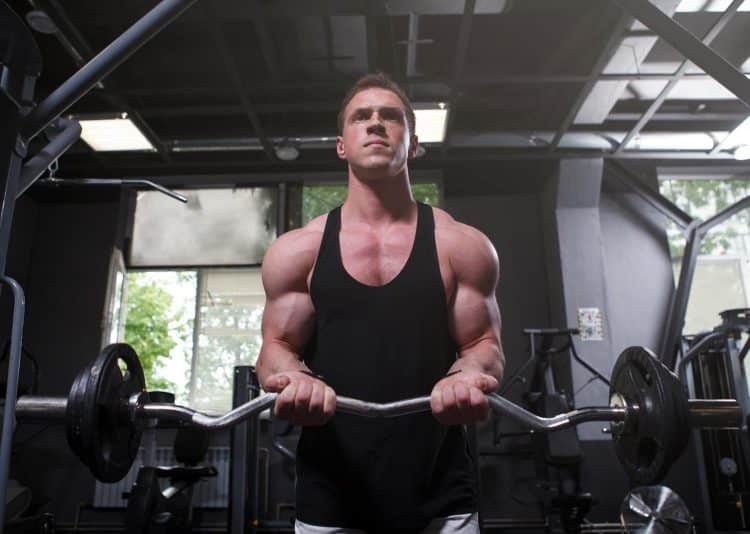
Steps:
- Hold your EZ bar with a medium-width, underhand grip. Stand with your feet about shoulder-width apart, knees slightly bent. Brace your core, pull your shoulders back and down, and look straight ahead.
- Without using your legs or back for assistance, bend your elbows and curl the bar up to around shoulder height.
- Lower it back down to full arm extension and repeat.
Tips:
- Do not use your legs or back to help you lift the weight.
- Push your elbows forward at the top of each rep to increase biceps engagement.
- Pause at the top of each rep and flex your biceps as hard as possible.
2b. EZ barbell skull crushers
Muscles targeted: Triceps.
Skull crushers are so-called because that’s what could happen if you fail to complete a rep or lower the bar too quickly. Use a spotter to prevent accidents but enjoy this challenging yet effective triceps-building exercise. Use the same bar/weight that you used for EZ barbell curls.
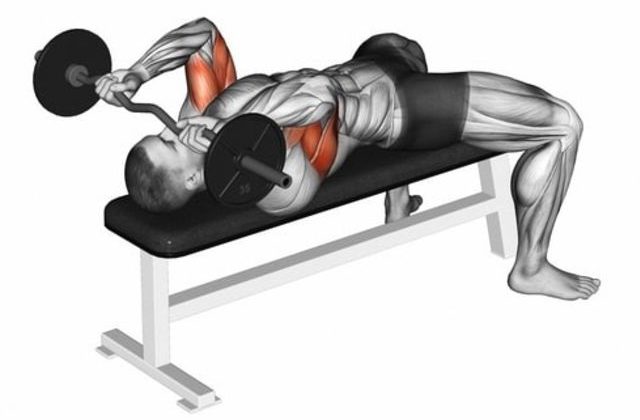
Steps:
- Lie on your back on a flat bench. Using a medium-width overhand grip, press and hold the barbell over your chest.
- Pull your shoulders back and down and plant your feet firmly on the floor. Brace your core.
- Keeping your upper arms vertical, bend your elbows and carefully lower the bar to your forehead.
- Extend your arms and repeat.
Tips:
- Try a slightly declined bench to increase triceps long-head engagement.
- Lower the weight toward the top of your head to get a bigger stretch in your triceps.
- Take care not to turn this exercise into bench presses. Keep your upper arms vertical and stationary throughout.
3a. Concentration curls
Muscles targeted: Biceps.
Concentration curls are an excellent exercise for building a higher biceps peak. Working one arm at a time, they also allow you to identify and fix any left-to-right imbalances.
Don’t go too heavy with this exercise. Instead, go slow, contract your biceps as hard as possible at the top of each rep, and put your mind in your muscle to fully engage your biceps. Do one set for each arm before moving on to the next exercise.
Steps:
- Sit on the end of an exercise bench with a dumbbell in one hand.
- Lean forward and rest the back of your upper arm against the inside of your thigh so your elbow is straight and the weight hangs straight down.
- Bend your elbow and curl the weight up toward your shoulder. Pause and squeeze your biceps hard.
- Extend your arm and repeat.
- Switch arms and do the same number of reps on the opposite side.
Tips:
- Squeeze your biceps as hard as possible at the top of each rep.
- Use your free hand to help you finish your last few reps if necessary.
- Supinate (rotate) your forearm as you bend your elbow to maximize muscle engagement.
3b. Triceps kickbacks
Muscles targeted: Triceps.
Many exercisers are quick to dismiss triceps kickbacks, saying they’re too easy or only suitable for women. However, the truth is that kickbacks are an excellent movement, especially for the long head of the triceps. That said, if done correctly, you won’t be able to use a heavy dumbbell, which can be a knock to the ego. Despite this, kickbacks are very effective.
Steps:
- Place one hand and one knee on a bench so your upper body is parallel to the floor.
- Hold a dumbbell in your other hand, bend your elbow, and pull your elbow up and into your ribs. Your arm should be bent to 90 degrees.
- Without moving your upper arm, extend your elbow and push the dumbbell back toward your hip.
- Bend your arm back to 90 degrees and repeat.
- Switch arms and do the same number of reps on the opposite side.
Tips:
- Go light – focus on squeezing and not swinging the weight up.
- You can also do this exercise with a cable machine or a resistance band.
- Extend your shoulder slightly at the mid-point of each rep to maximize triceps long-head engagement.
4a. Biceps cable curl
Muscles targeted: Biceps.
While there is nothing wrong with freeweight biceps and triceps exercises, cable machines offer a couple of advantages. For starters, they keep your muscles under near-constant tension, creating an incredible pump. Secondly, they’re ideal for drop sets, which are an excellent way to finish your arm workout. Any way you slice it, cable exercises are a great addition to your arm workout.
Steps:
- Attach a revolving bar to a low cable machine. Grip the bar with an underhand, slightly narrower than shoulder-width grip.
- Stand with your feet about shoulder-width apart, knees slightly bent, core braced, and upper arms by your sides.
- Starting with your arms straight, bend your elbows and curl the handle up to your shoulders.
- Extend your arms and repeat.
- Do 2-3 drop sets on your last set.
Tips:
- Pause at the top of each rep and squeeze your biceps to maximize muscle engagement.
- Push your elbows forward slightly at the top of each rep to increase biceps long-head recruitment.
- You can also do this exercise with a cable EZ bar if preferred.
4b. Triceps cable pushdown
Muscles targeted: Triceps.
Triceps cable pushdowns are an excellent way to finish your arm workout. They’re a low-skill exercise that leaves you free to focus on cranking out the reps and pushing your triceps to failure. Plus, they’re the perfect exercise for drop sets. Work hard; this is your final exercise.
Steps:
- Attach a straight revolving bar to a high pulley machine. Grip the bar with a slightly narrower than shoulder-width overhand grip.
- Pull your upper arms down to your sides and stand with your feet hip-width apart, core braced, and knees slightly bent.
- Push the bar down toward your upper thighs. Straighten your arms hard to fully engage your triceps.
- Bend your elbows as far as possible while keeping your arms next to your sides.
- Do 2-3 drop sets on your last set.
Tips:
- Pause at the midpoint of each rep and flex your triceps.
- Brace your abs and keep your torso stationary throughout.
- You can also do this exercise with a rope or EZ bar handle.
Biceps and Triceps Superset Workout – FAQs
Do you have a question about our biceps and triceps superset workout or arm training in general? No sweat because we’ve got the answers!
1. Can I change any of the exercises in this workout?
You are free to make whatever changes you like to these workouts. For example, if you don’t have a cable machine, you could do freeweight, resistance band, or bodyweight exercises instead. Also, if you find any exercise uncomfortable or painful, go ahead and swap it for something more suitable.
However, avoid changing an exercise just because it’s hard. It’s those challenging exercises that drive your progress.
2. What diet should I follow with this workout?
Our superset workout is a bodybuilding program designed to increase upper arm strength and size. To build muscle, you need a calorie surplus and to consume enough protein – typically one gram for every pound of body weight. Also, you should try to eat healthy, as your body needs plenty of vitamins and minerals.
Align your diet to your training to ensure you get the best possible results from your workouts.
3. Will this program work with blood flow restriction training?
Blood flow restriction (BFR) or occlusion training involves working out with snug-fitting elastic bands around your limbs. This reduces or occludes blood flow into the area, making your workout harder while creating more metabolic stress. According to some fitness experts, blood flow training can enhance muscle building.
While you may not want to use BFR wraps for your entire arm workout, you could certainly use them for the final 1-2 exercises.
4. What weights should I use for the exercises in this workout?
Unfortunately, we can’t answer this question because we don’t know how strong you are. So, while it will take a workout or two, you’ll need to experiment to find the right weight.
This weight should take you close to failure within the prescribed rep ranges. For example, for the first two exercises, if you can do more than eight reps, the weight is too light, but if you can’t do six, it’s too heavy. Finetune your workout until you’re in the rep-range sweet spot.
However, you should also strive to increase your weights every week or two. This will ensure you keep making progress. That said, never sacrifice good form for more weight on the bar. Your technique should not change even though you’re using heavier loads.
5. What about forearm training? How can I incorporate that into my arm workout?
Bigger, more muscular forearms can add a lot to the appearance of your arms. Some people find their forearms grow because of their general back and arm training. However, others need to train their forearms more directly to make them grow.
If you fall into the latter category, you could add a forearm superset to your biceps and triceps workout. Choose a wrist flexion and a wrist extension exercise and do them back to back.
For example:
6. How long should I follow this superset arms workout?
Even the best workouts lose their effectiveness after a while, but how long that takes depends on you. People respond differently to the same workout, and while one person may plateau after six weeks, another may still be making gains after three months.
So, stick with the plan for as long as you feel it’s working. Switch to another arm workout when your progress begins to stall. You can always come back to this workout in a few months when, after a break, your muscles should respond to it again.
Closing Thoughts
A lot of exercisers wish they had bigger arms, but you need more than wishes if you want your biceps and triceps to grow. Instead, you must work hard and commit to a long, arduous road of consistent training. Big arms don’t happen by accident.
In terms of time efficiency and effectiveness, superset workouts are hard to beat. They allow you to pack a lot of volume into a short timeframe and also deliver that all-important pump.
Do our biceps and triceps superset workout 1-2 times week for the next couple of months, and your arms are guaranteed to grow. Let’s turn those pistols into rocket launchers!
